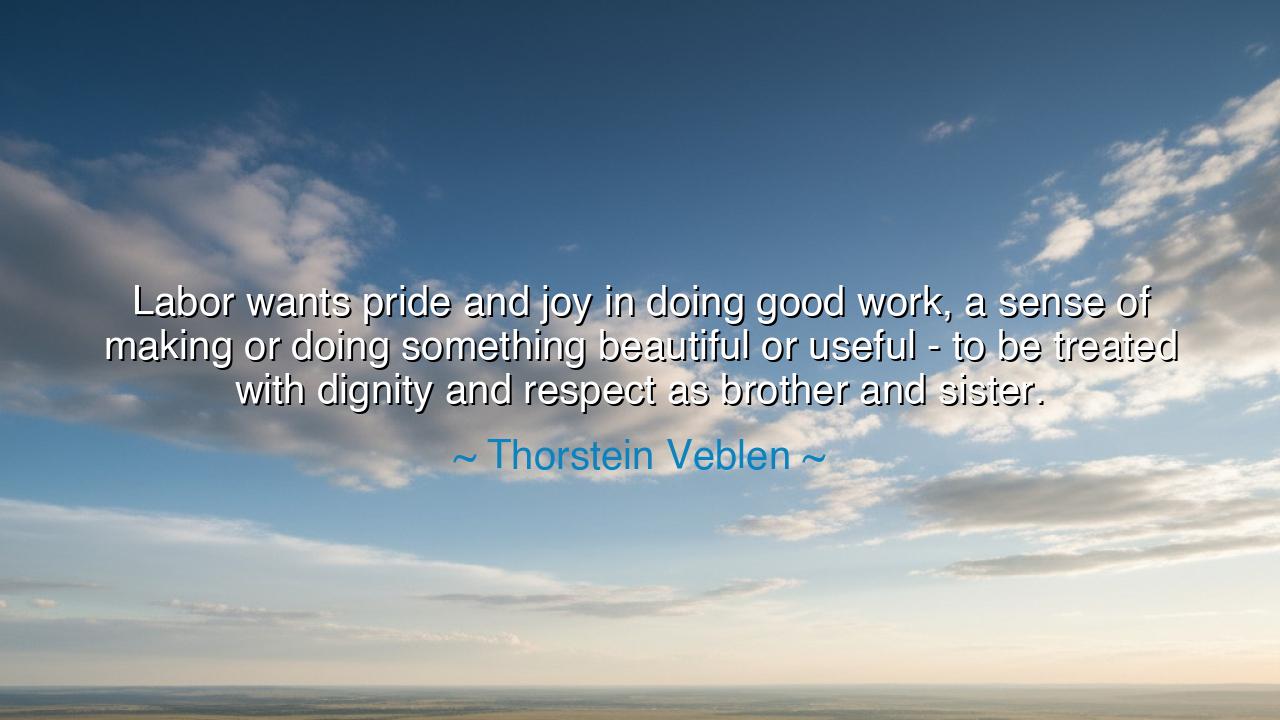
Labor wants pride and joy in doing good work, a sense of making
Labor wants pride and joy in doing good work, a sense of making or doing something beautiful or useful - to be treated with dignity and respect as brother and sister.






Hearken, O children of labor and seekers of meaning, to the words of Thorstein Veblen, who declared: “Labor wants pride and joy in doing good work, a sense of making or doing something beautiful or useful—to be treated with dignity and respect as brother and sister.” Within this statement lies a truth that resounds across ages: that work, in its highest form, is not a burden but an expression of the human spirit. To labor with purpose, to create with care, and to be honored for one’s effort—these are the pillars upon which dignity and community stand.
Since the earliest days of civilization, from the hands that shaped clay into vessels to those that raised temples to the heavens, labor has been the bond that unites humanity. The builders of the pyramids, the masons of cathedrals, the farmers who coax life from the earth—all shared a sacred desire: not merely to toil, but to find meaning and beauty in their craft. Veblen’s words awaken this ancient understanding—that labor is not simply the exchange of effort for sustenance, but a reflection of the soul’s need to create and contribute.
In his age, Veblen, the great economist and social critic, observed the rise of industrial capitalism—a world where men and women became cogs in vast machines, their individuality swallowed by profit and productivity. Against this tide, he raised his voice in defense of dignity. He saw that when the worker is stripped of pride, when labor becomes mere survival, the human spirit withers. For to work without respect is to live without recognition, and to create without joy is to deny one’s nature as a being of purpose.
Consider the story of William Morris, the 19th-century craftsman and reformer who rebelled against the soulless mechanization of his time. He taught that the worker must be both artisan and artist, finding beauty in every act of creation. His workshops revived the ancient marriage between hand and heart, echoing Veblen’s belief that labor, when dignified, becomes a form of art. Through this, Morris restored to his workers not just employment, but meaning, pride, and joy—the very treasures Veblen held sacred.
Veblen’s call to treat every laborer as brother and sister reminds us that work is not a hierarchy but a fellowship. The mason and the poet, the teacher and the farmer—all share the divine inheritance of purpose. The ancients spoke of this unity: in the guilds of medieval Europe, in the communal fields of early societies, the dignity of work was celebrated through ritual and song. It is only when the bonds of respect are broken, when profit replaces honor, that division and resentment take root.
The lesson is profound and eternal: dignity in labor is the foundation of a just society. To create environments where workers find joy, pride, and meaning is to cultivate not only prosperity but harmony. For when a person feels respected in their craft, their work becomes a contribution to the collective good, an offering to both community and creation. The wise know that no task is small if done with excellence and love.
Practical action flows from this understanding: honor the work of others, whether it be grand or humble. Give thanks for the unseen hands that build, clean, grow, and heal. In your own labor, seek not only success but purpose and beauty. Encourage workplaces that value human worth above mere efficiency, and remember that every act of creation, when done with integrity, uplifts the whole of humanity.
O seeker of wisdom, remember this: labor is sacred when joined with joy, purpose, and respect. Let the words of Thorstein Veblen remind you that to dignify the worker is to dignify life itself. In the sweat of the brow and the striving of the heart lies the poetry of existence. To work well, to be honored for one’s effort, and to honor others in turn—this is not merely economics, but the art of being human.






AAdministratorAdministrator
Welcome, honored guests. Please leave a comment, we will respond soon